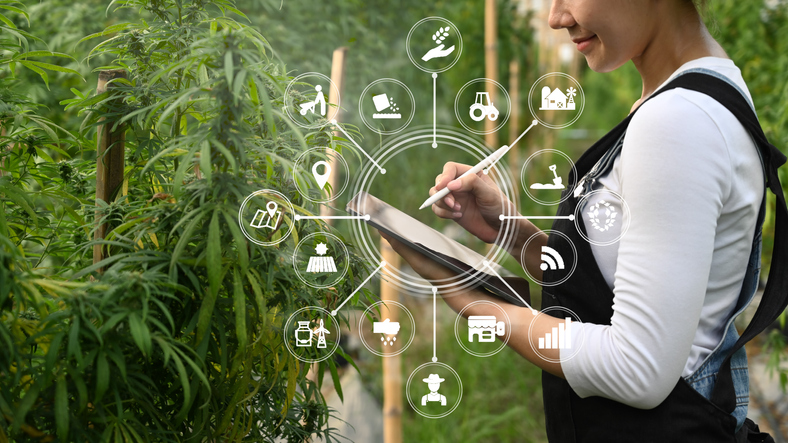Discover three innovative technologies changing the CBD industry for the better, from smart farming to nanotechnology to blockchain. Click to Read on.
Introduction
For years, cannabis and CBD have been buzzwords in the health/wellness industry. The CBD market is seeing growth fueled by innovative technology. CBD-infused edibles have grown this sector into a multibillion-dollar industry.
Though several countries, like the United States, have legalized cannabis for recreational use, opening up new avenues for development, one must still comprehend the various aspects of the plant. Furthermore, Wall Street experts predict that the sector will be worth more than $75 billion in a decade.
That’s enormous! Because cannabis reacts distinctively, studies may aid in the development of more efficient products in the future. Perhaps now is the moment to realize the full potential of the cannabis and CBD industries. You can get THCv gummies online nowadays, which has expanded the customer’s ease of buying them. Let’s get started.
6 Technologies That Are Enhancing The CBD Industry
- Water Soluble Technology
- CO2 Extraction Machines
- Mobile Apps and E-commerce Platforms
- Purity Testing Machines
- Advanced Packaging Technology
- Blockchain Tracking Systems
The Current State of the Cannabis and CBD Industries
If it hasn’t already occurred to you, what is CBD before we get into insights and data? It is mainly derived from hemp.
Consider it a related (let’s say, a cousin) of marijuana. As a result, hemp and marijuana are both members of the cannabis genus. And you are correct; there are numerous CBD applications, ranging from migraine relief to skin rashes.
On the one hand, the CBD market is growing quickly, but on the other, one must still work within the confines of cannabis legalization.
1. Cloud Usage
Data will always be important, whether it is for growing plants, customer and order administration, or state compliance. The good news is that business executives may improve productivity by utilizing computing services and solutions such as Amazon Web Services, Google Cloud, and Microsoft Azure, which provide storage and processing capabilities. Cloud platforms ensure information accessibility and retrievability. As a result, the entire cannabis development cycle has been greatly enhanced. Furthermore, the cloud allows for the monetization of data and the extension of the seed-to-sale lifecycle.
2. Internet of Things
It is a system of interconnecting devices that can communicate and interchange data with one another. IoT can help the farmer control and automate lighting, irrigation, ventilation, or even harvesting in his setting.
Smart farming technology can help hemp and cannabis growers maximize crop yield and quality, minimizing the costs and environmental exposure and improving the stipulations and standards of the CBD industry.
3. Bioavailability
Many recent breakthroughs in the CBD field have improved CBD bioavailability. CBD products typically have a limited bioavailability. Suppose someone consumes CBD, say in the form of an oil; the body removes 80 to 90 percent of the CBD.
With multiple parameters influencing CBD bioavailability, utilizing diverse technologies is crucial. Nanoencapsulation is one of the most promising of these technologies.
The technology improves the human body’s ability to absorb CBD in its purest form into the bloodstream. As a result, nanoencapsulation improves the situation by converting CBD molecules into easily absorbable particles.
4. Improved CBD Extraction
It always helps to bring out the best when old techniques are weeded out, and new ones are lined up. What does this signify in terms of CBD? Today, CBD extraction methods help ensure the purity of CBD oil, tinctures, and various other products.
Supercritical CO2 extraction is a potential extraction technology. The approach has aided in the extraction of CBD from plants. It is fast, safe, and clean and is also reasonably priced. It’s no surprise that firms favor and extensively use the simple method of extracting CBD oils and wax from cannabis.
Sequencing of DNA
The cannabis Sativa plant has numerous advantages. The plant strains, however, vary greatly, resulting in a varied balance of THC, CBD, and other components.
The good news is that contemporary genomics can assist in releasing the plant’s full potential. Leading cannabis cultivators are also attempting to sequence the DNA of Cannabis Sativa to understand better how the plant manufactures the compounds it contains.
A Colorado-based startup claims to have created a way to use the CRISPR gene to grow plants that do not contain THC or CBD. As a result, customized plant breeds are frequently easier to cultivate.
Researchers are also looking for enzymes within the plant that make even rarer cannabinoids, such as CBC, which has potent anti-inflammatory properties.
Conclusion
The CBD industry has been completely transformed by technology. It ranges from growing hemp and cannabis plants to CBD product manufacture and distribution to the consumption satisfaction of customers.
It can improve the quality and quantity of hemp and cannabis cultivation and enhance the bioavailability and potency of CBD products. Technology can help the CBD industry overcome challenges and seize opportunities for a more sustainable, innovative, and profitable future.
By leveraging technology, the CBD industry can create a more sustainable, innovative, and profitable future for itself and its consumers.
